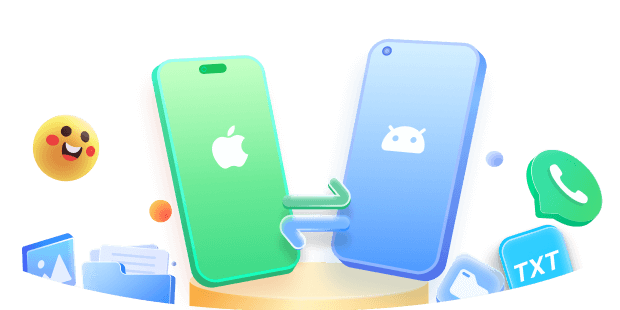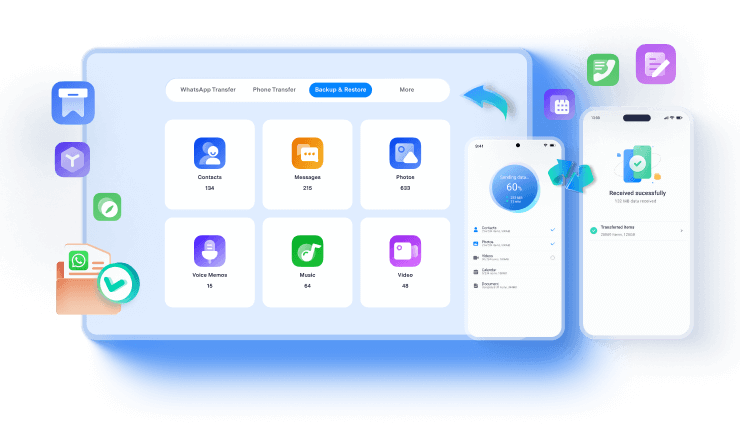Saving tens of photos and videos on your iPhone is essential. It helps us remember precious memories and experiences. However, at some point, you may run into the annoying "Storage Almost Full" message. You can optimize iPhone storage to avoid the inconveniences caused by limited phone storage.
These include being unable to update your iOS software or download more apps. In the worst-case scenario, your iPhone may even crash more often.
Optimizing iPhone storage doesn't necessarily mean deleting some of your files. So, what does it mean, and how do you do it? Read on to learn how to make the most of your beloved iPhone.
In this article
Part 1 What Does Optimize iPhone Storage Mean?
Optimizing iPhone storage means managing your existing content to create more storage space. There are many ways to do that. One is by enabling the Optimize iPhone Storage (Optimize Photos) feature.
Optimize Photos automatically replaces your original, full-resolution content with smaller, space-saving versions. The full-resolution formats are saved on iCloud. You can access them individually and download each one from the cloud-based platform anytime. All you need is a stable internet connection.

The conversion large-size photos and videos to small-file versions frees up a lot of iPhone storage. This iPhone storage optimization declutters your phone and allows it to perform optimally.
But iCloud storage can also run out quickly, depending on the size of your files. To check how much space that you have:
- Open Settings on your iPhone and enter your name.

- Scroll and tap iCloud.

- The bar graph indicates the overall storage usage. From there, you can work out the space available.

Upon signing in to iCloud, every iPhone user gets 5GB of free storage. The good news is that you can buy more space (upgrade) to suit your storage needs. For example, you could upgrade to the 50GB plan for $0.99.
Part 2 Basic Methods to Optimize iPhone Storage
Each time you capture a photo or video with your iPhone, it's saved in high resolution. These high-resolution pictures and videos take up a lot of space. So, learning how to optimize iPhone storage is critical.
By leveraging iCloud storage, you can prevent your device from running out of space. You do that by turning on the Optimize iPhone Storage feature.
Here are the simple steps:
- Go to Settings on your iPhone.

- Scroll down and choose Photos.

- Toggle Optimize iPhone Storage on.

As mentioned, your photos and videos will be saved in lower resolutions. That will help you free up space without deleting your precious content. You can also optimize storage on your iPhone by managing HDR pictures.
In HDR mode, your iPhone saves two copies: the original and the HDR-enhanced format. You don't have to keep the original copies each time you take a picture. Here's how to automatically delete them:
- Open the Settings app.
- Tap Camera.
- Toggle the Keep Normal Photo to off. That will only save the HDR photos, creating room for more content.


Part 3 Optimize iPhone Storage by Backing It Up to Your Computer
As mentioned, iCloud space can run out at some point as well. You can pay for more storage by upgrading your current iCloud plan. Or, you can use Wondershare MobileTrans to free up your iPhone storage by backing up large-sized data to a computer.
MobileTrans supports over 18 file types! That means you can back up photos and videos, music, messages, apps, and more. This application is also safe and user-friendly - you don't need to be tech-savvy.
- It supports over 6,000 types of devices across both iOS and Android systems.
- Besides backup and restoration, it also allows users to transfer data between devices.
Wondershare MobileTrans
Back Up Your iPhone Data to Save Storage!
- • No data loss. No data leaks.
- • Support various data, including files, photos, videos, apps, contacts, etc.
- • Support over 6,000 types of devices across iOS and Android.

 4.5/5 Excellent
4.5/5 ExcellentHere are the steps to back up your iPhone to a computer using the MobileTrans - Backup & Restore feature:
- Download and install Wondershare MobileTrans on your computer.
- Connect your smart to the computer using a USB or lightning data cable.
- Open MobileTrans and choose Backup & Restore from the app's home page. Choose Backup under Phone Backup & Restore.
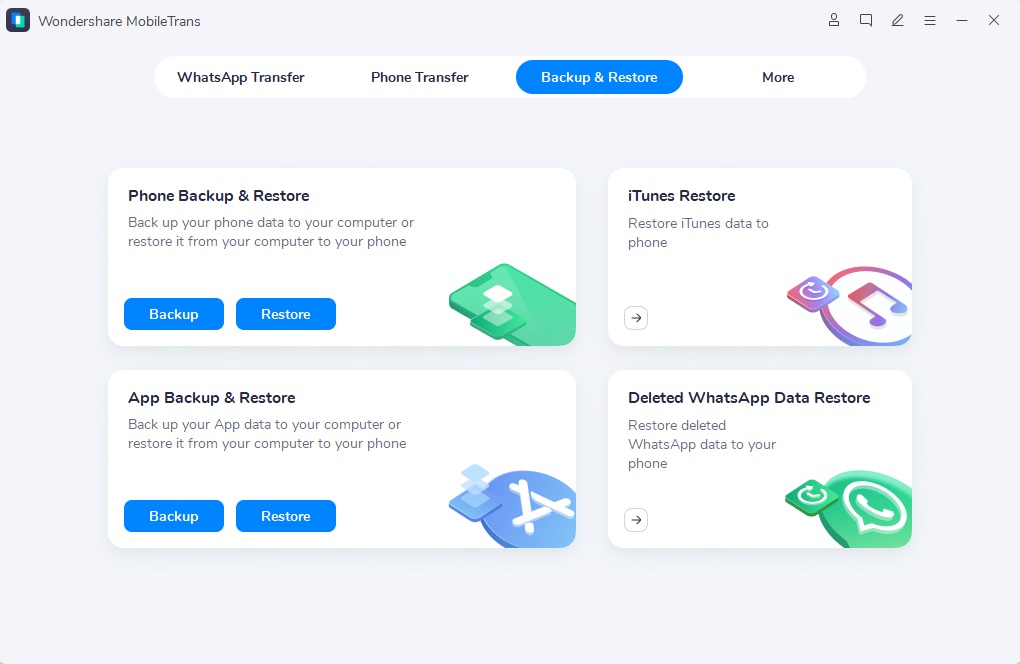
- Select the type of data you want to back up by checking the boxes next to the data category. After that, click Start.
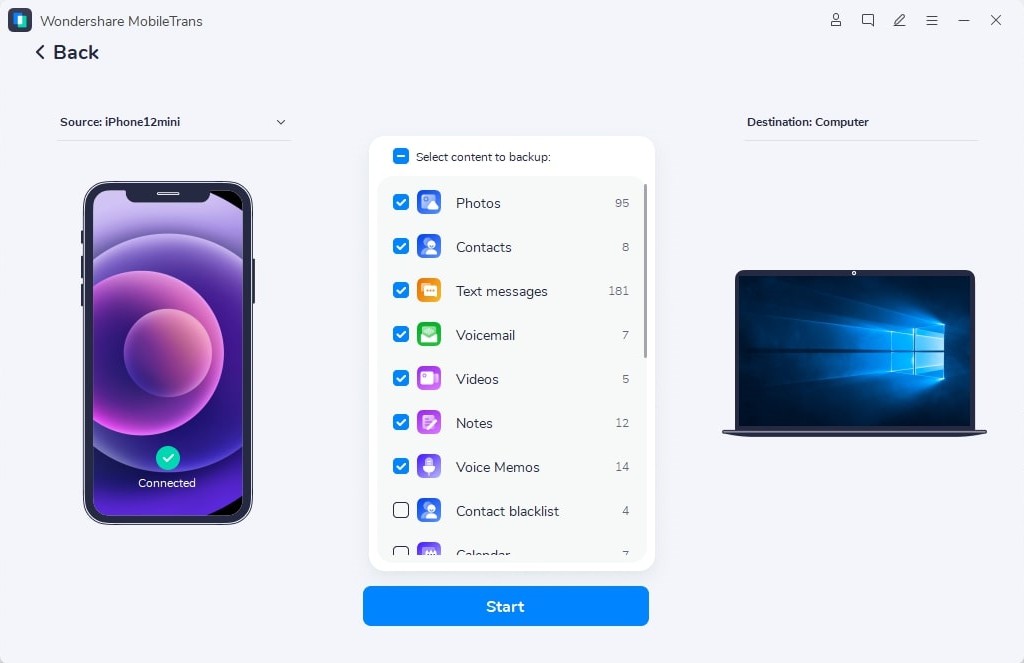
- Wait a few minutes for MobileTrans to complete the backup process. Disconnect your iPhone once completed.
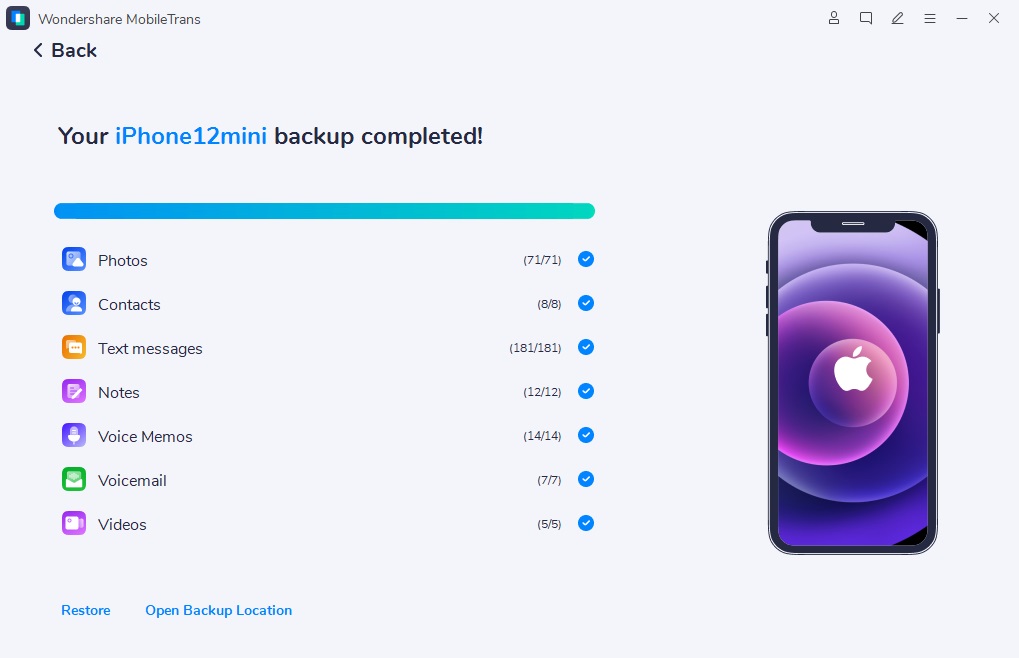
That's how to optimize storage on an iPhone without deleting important content. Should you ever need the files back to the iPhone, you can return them with a few clicks. Here are the steps:
- Connect the iPhone to the PC and open MobileTrans.
- Choose Backup & Restore from the app's main interface. Click on the Restore option under Phone Backup & Restore.
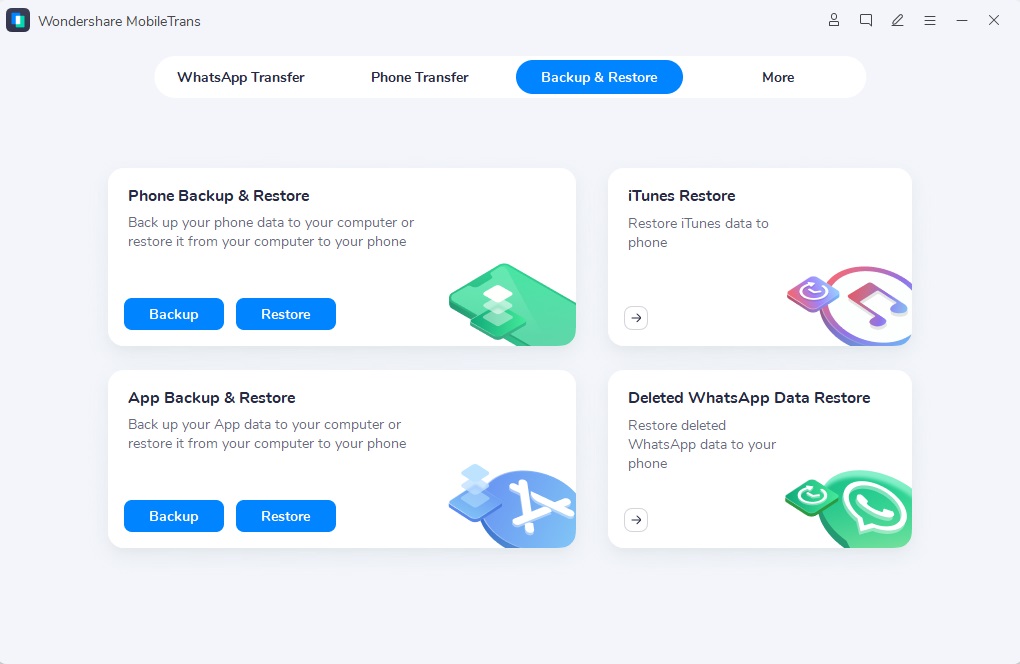
- Choose files to restore (if you made several backups) and then click Start. MobileTrans will complete the restoration in a few minutes.
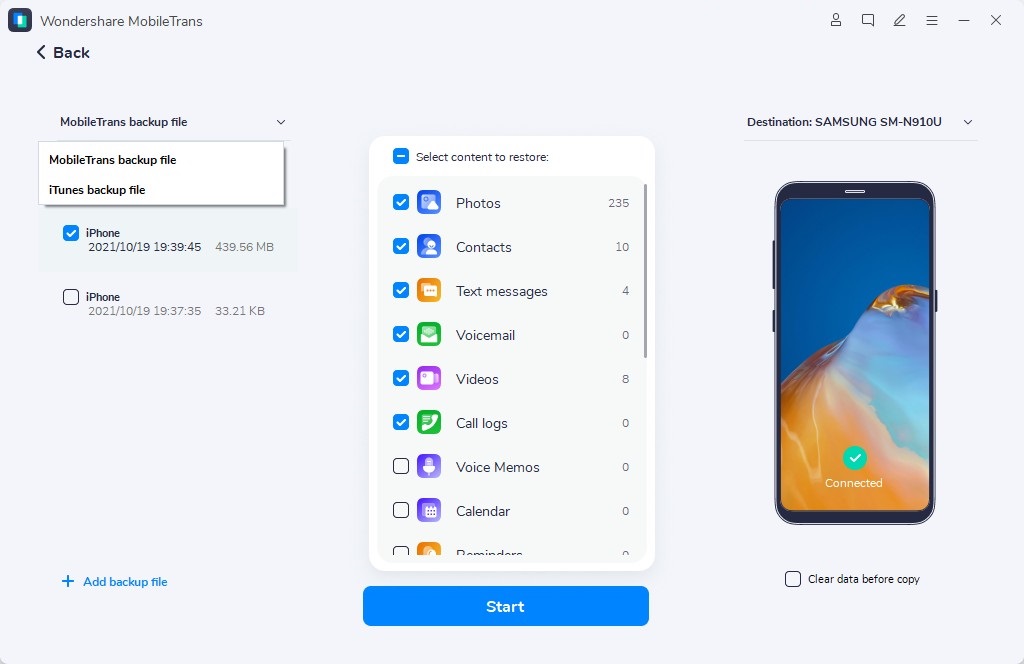
Part 4 Other Ways to Optimize iPhone Storage
As mentioned, there are many ways to optimize iPhone storage. In this section, you'll find some practical tips to help free up from a few MBs to tens of GBs of space on your iOS device. Take a look:
-
Uninstall/Offload Unused Apps
Uninstalling unused apps may sound obvious, but it's a tip many iPhone users overlook. Your iPhone may be hosting a dozen apps you downloaded but hardly use. These apps can gobble up a lot of space on your device.
Deleting them could optimize your iPhone storage and create up to 1GB of additional space. Here's how to go about it:
- Identify an app on your phone's Home Screen that you hardly use.
- Touch and hold it, then tap Remove App.

- Choose the Delete App to erase it from the iPhone's memory.
If you go through Settings, you'll notice two different options for managing unused apps. "Delete the App" and "Offload the App."
When you offload an app, you delete it, freeing up local storage space on your device. However, the app data remains on the device. That means you can reinstall the app if you decide to later.
To offload an app, Open Settings > General > iPhone Storage > Tap Enable for automatically offloading (optional). Tap the app you want to offload then tap "Offload App."

-
Clear Cached Browser Data
Your web browser saves many things, such as cookies, browsing history, and other temporary files. All these enhance your internet experience. They save time and even your device's battery because data is already stored in the memory.
However, too many cached files can consume a lot of space and impact your device's performance. So, how do you optimize storage on an iPhone by clearing the browser cache? The steps vary slightly, depending on the browser you're using. If you're using Safari:
- Open Settings on your iPhone and choose Safari.

- Scroll through the options, then tap Clear History and Website Data.

But if you're using Chrome browser:
- Open the Chrome app, scroll through, and tap More.
- Choose History and then Clear browsing data.
- Tick the "Cached Images and Files" and "Cookies, Site Data" boxes.
- Tap Clear Browsing data.

Clearing your cache will likely close all open tabs on your browser. You should bookmark them first.
-
Delete Content Recently Purchased from iTunes.
Like apps, music, podcasts, and videos can consume a giant chunk of the device's storage. Another way to optimize phone storage on iPhone is to keep your iTunes content to a minimum.
Just delete the items you're not using right now. You can always re-download them should you need them at a later date.
iTunes allows you to download items you recently bought to up to 10 tens to your authorized devices, So you won't lose whatever you delete from your iPhone. To delete music:
- Open Settings and tap General.
- Tap iPhone Storage and then Music.
- Tap Edit.

To erase the entire music library, choose the red minus sign next to "All Songs," then tap Delete. But if you decide to eliminate an artist or two, tap the red minus sign next to the artist's name and choose Delete.
To delete downloaded podcasts, follow steps 1-2, but this time, choose Podcasts. Hit the Edit button.
You can also click the red minus sign next to a podcast to delete any downloaded episode. You can keep your smartphone from automatically downloading podcast episodes in the future. Go to Settings > tap Podcasts > tap Automatically Downloaded under Automatic Downloads > select Off.

While at it, consider permanently deleting videos you don't need anymore. Go to Settings > iPhone Storage > Show All > Review Personal Videos. Find the ones you want to delete, then tap Trash, then Delete From This iPhone.
-
Erase Messages App Data
Texts can also take up a significant amount of space. That's especially true for conversations with attachments like GIFs, photos, and videos. You can optimize iPhone storage by clearing some of this content. You can delete entire discussions, individual messages, or specific attachments.
Open the Messages app, find the conversions you wish to delete, swipe left, and tap Delete twice. You may keep the conversations but remove the attachments. In that case, go to Settings > General > iPhone Storage.
Choose Messages. You'll find different categories, including stickers, videos, photos, and Others. You can also see the amount of storage each category is using.
It's a good idea to set your iPhone to erase messages automatically after 30 days or a year. Go to Settings > Messages > Keep Messages and then choose 30 Days or 1 Year. Tap Delete.
Conclusion
After reading the guide above, you've learned what optimizing iPhone storage means. You've also known how to optimize storage on your iPhone. But before you leave, here's a recap:
- Optimizing storage means managing content on your device to create more storage space.
- Photos and videos can take up the most significant chunk of your iPhone's memory.
- Enabling the iPhone Storage Optimization settings is a good idea. It allows the device to save high-resolution photos and videos on iCloud.
- Another iPhone optimization storage tip is to delete/offload apps you rarely use. Or you can clear browsing cache, Messages app's data, downloaded videos, and Podcasts.
Now, unclutter your iPhone by implementing the knowledge you've gathered here. MobileTrans can also help free up storage to optimize iPhone performance. You can back up some files to a computer and restore them to the iPhone later.

 4.5/5 Excellent
4.5/5 Excellent